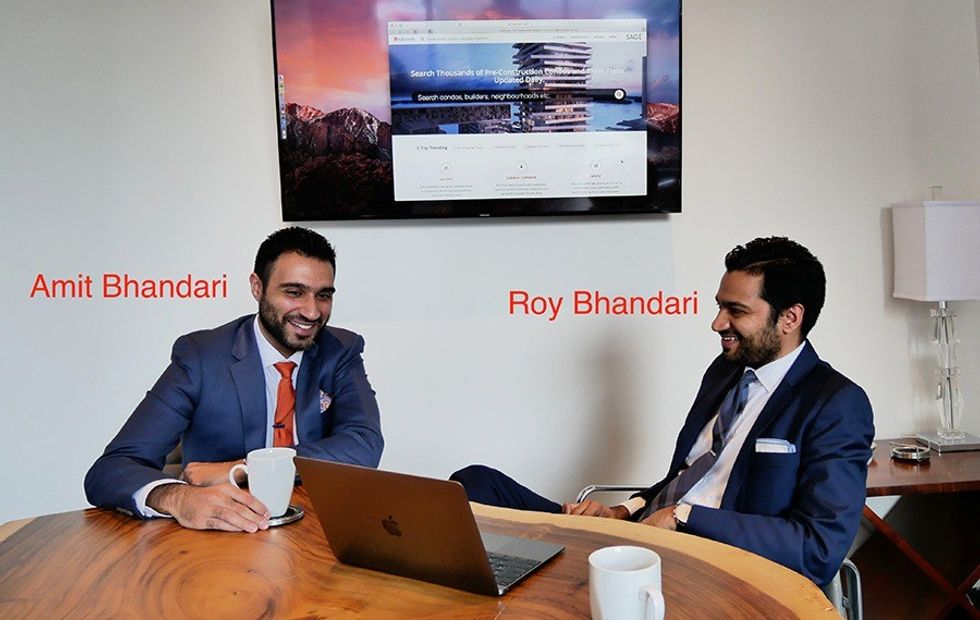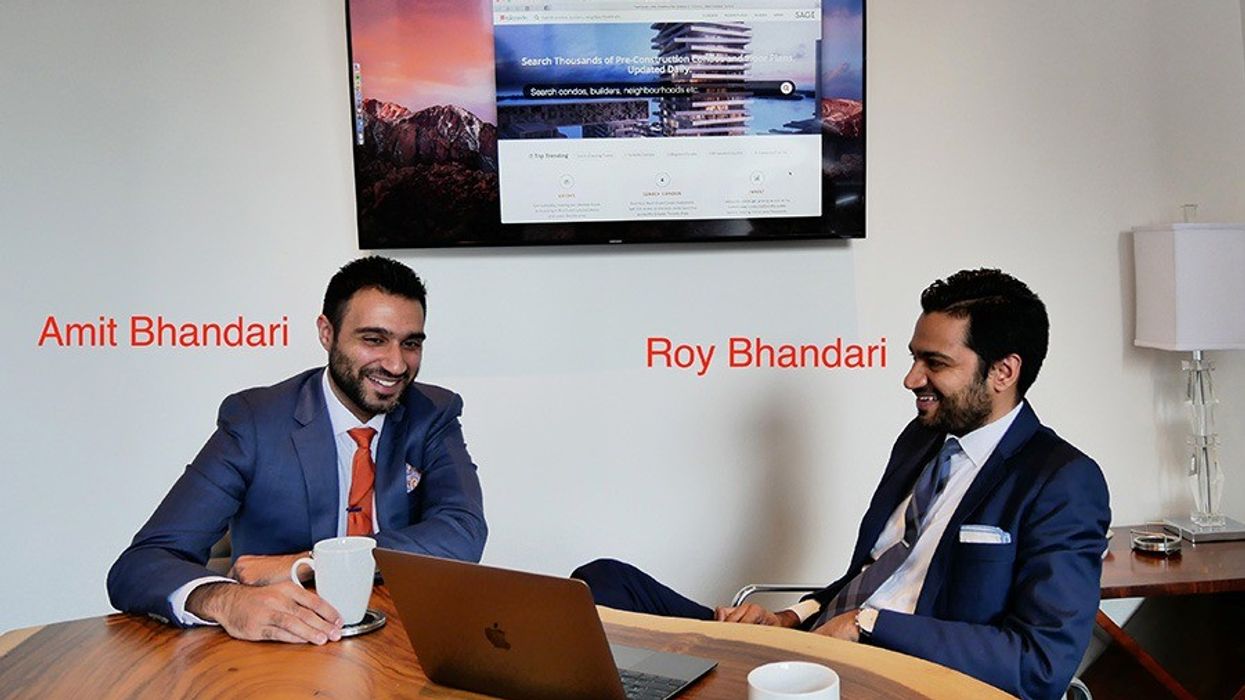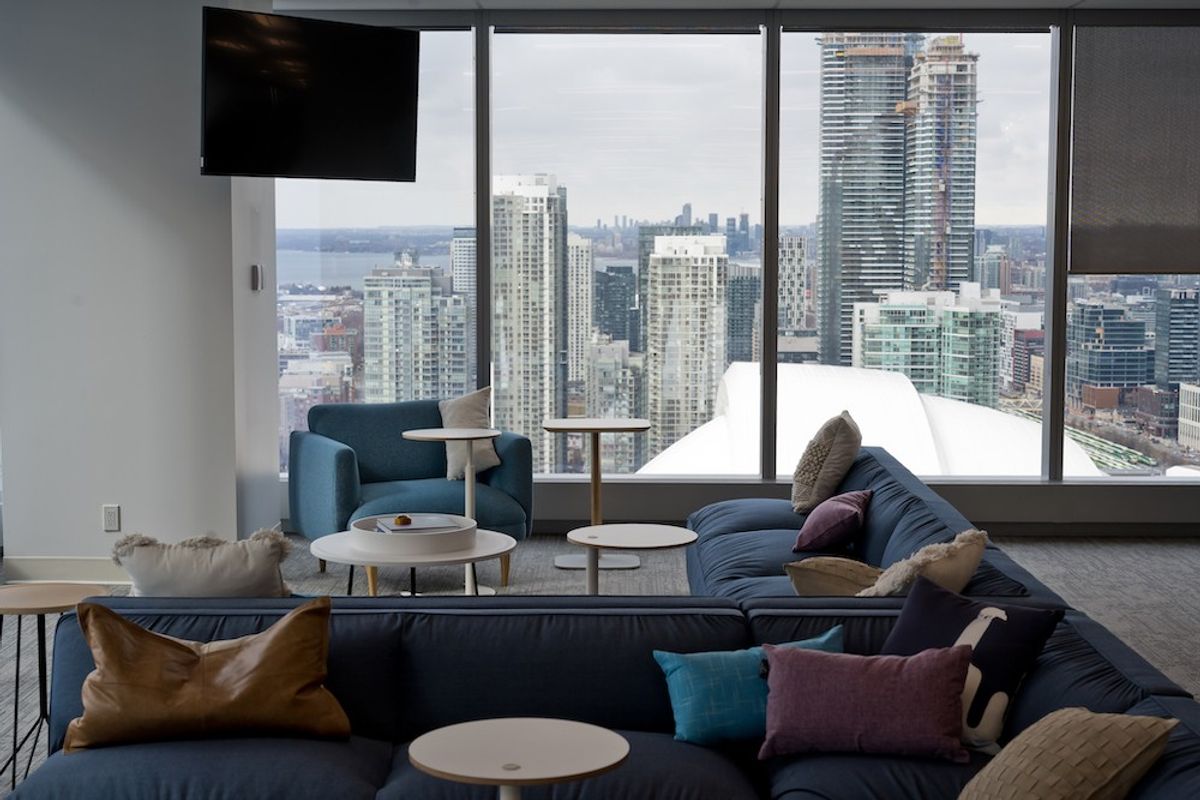
Roy and Amit Bhandari are accidental real estate agents.
Roy likes to say they “tripped” into real estate after their father — a man who had dabbled in real estate investing at home in England — wanted access to the Toronto Real Estate Board, but couldn't get over the exam for his real estate license.
“I said I would take the test, get the license and he could have access through me,” says Roy.
That was between second- and third-year university. His older brother, Amit, soon followed, drawn to the allure of entrepreneurship, and the brothers have never looked back. They immigrated to Toronto from the East Midlands of England in 2001 — recognizing Canada as “new and shiny” and a “land of opportunity.”
But it wasn't all sunshine and lollipops at first. The two nearly quit the business in 2009 because they just didn't have the passion for the resale market and their business was floundering. It wasn't until their manager convinced them to give it another shot that they switched gears and focused on the investment side, with pre-construction condos, that things started to take off.
Now their company, SAGE - TalkCondo Ltd. is considered a “platinum” brokerage by developers. The Bhandaris’ investor clients get first crack at the city's hottest condo projects, often at a discounted rate, because the brothers are known for selling condo units in bulk and developers trust them to tell them what the word on the street is as far as what buyers are looking for.
The two came together for an exclusive interview with Toronto Storeys, revealing the secrets of their working relationship, how they make the pre-construction buying experience as easy as possible for their clients and why they think sales offices at condo developments will soon be a thing of the past.
What enabled you to start working together as brothers and what is that like?
Amit: That's how it started actually. I was in the corporate world. My brother had just finished university and got his license, so I got my license as well and we figured you know what? Let's just do it. You know something? As kids we'd have these really grandiose conversations, ‘Oh yeah, one day we'll be company owners,’ and working in real estate has given us the opportunity to bring that kid-ish idea to life. Working together has been really good. We've had some disagreements over the years, but they have never led to, ‘I wish I never started this business with you.’ It has never been like that. I also think the skills that we bring to the table are very unique to us as individuals but they work so well together.
Roy: I was going to say that. We have very complementary skill sets like, he's good at A and I'm good at B and it just works.
Amit: He's very creative like, he gets mad if the font is wrong on our marketing material, whereas I'm very technical. I have an IT Management degree, so my mind is full of processes.
Do you think your clients gain advantage working with the two of you because you are family?
Roy: When we're dealing with clients we're very quick to figure out who would be better for which client.
Amit: What we do is we provide investors that early access to developments and then from a developer’s side, we are the first point of contact to the world of individual investors, so we're the ones that have the clout and the online presence to bring in the investors, broker the deal and make it happen. We are the ones providing that future housing stock, so without us as an investor you're too late. If you go in on your own, you've missed the boat.
What issues or innovations do you feel will have a profound effect on the industry in the future?
Roy: It's already very online, but I think it's going to be even more online. On our website we now include floor plans, so a lot of the time people will call us because they want to get the floor plan for pricing and now all of the sudden we're giving that away for free essentially. We believe that the more information you give, the better it is. The more educated the client is … I think we'll just be able to give away more and more. Will people be able to buy a condo online with a credit card? I don't know. That would be the next major change and I don't know how far away that is, but I think it's the next major jump.
Amit: Any new technology is exciting. They do need to be embraced because it's the natural progression of everything. One area that I'm excited about is augmented reality and what that could mean for real estate. You point your phone at a listing perhaps and your phone shows the price and other details. In our world you could point it at a construction site or a building and anything along those lines. When it comes to technology and innovation in real estate, you should always look at it as a business first, so anything that can help our clients needs to be embraced. There will always be these new technologies that disrupt certain businesses – we've already seen it with retail – and it just means you need to adapt to that change.
Roy: One of the companies that provides renderings for developers is seeing a huge uptick in requests for virtual reality, so builders aren't building sales offices anymore, they're ordering VR headsets. We'd be able to, in theory, e-mail a link to the buyer, they'd stick on a VR headset and then they can walk through the lobby of a building that hasn't been built yet in real time. The uptick on this has been very big in the last six to 12 months and to expect this in the near future. I think that's awesome.
What's your best advice for making a pre-construction buying experience the best it can be?
Amit: It's all about needs and wants and narrowing down what the client is looking for and then based on that you can sort of narrow down which direction to look in. Like my brother mentioned earlier, we always sort of sit down and go through the process by educating them first and tell them what this whole investment vehicle is all about. Based on that, they say, “This is what I'm looking for, what would you advise?” and we sort of take it from there. We both believe in education. If an individual is wrongly educated on anything, that ultimately shapes their experience. If they've been given the wrong information and advice, then their experience will not be as good as it could have.
Roy: In our world, the demand for new products tends to be very top heavy. The demand tends to be very, very high in that initial launch phase, so we say, “Based on what you've told us, here are the products we think are right for you,” and it's about being ready to go. In that initial launch phase it can be very stressful, so it's about managing that whole process and expectations as well. These launches happen but they happen extremely fast.
What is your take on the real estate market in Toronto as it stands now?
Roy: I'm a firm believer that as a city we're moving in the right direction. For all the fault Toronto has in infrastructure, we more than make up for in our social fabric. I do think it's one of the best places in the world to live. You go anywhere in the world and nowhere has the multiculturalism Toronto has and there's a lot going for it. I always say, when it comes to its growth trajectory, Toronto is still a baby in terms of the density, in terms of where the city is going and in terms of the jobs. In terms of where we're going, it only feels unaffordable. On a global scale, we're not yet with the New Yorks and the Hong Kongs and the Londons – we're 40, 50, 60 years behind those guys – but if we want to grow to be that, certain things have to fall into place.
One of those things is housing affordability. If we talk about $1 million as an entry point for buying a house in Toronto, if you go to one of those top 10 cities mentioned with $1 million and say you want to live in the city, you get laughed at – it just doesn't happen. If you look at Toronto versus other major cities, home ownership rates are abnormally high. If you go to any other major city, it is standard to lease where you live. In Toronto, I think we are starting to see that shift. Don't get me wrong, I think home ownership is very, very important. But I do think that's a natural progression of a major city and I do think that's going to change. We are starting to see that it's more normal to rent than it is to own and we're going to see that shift big time.





















